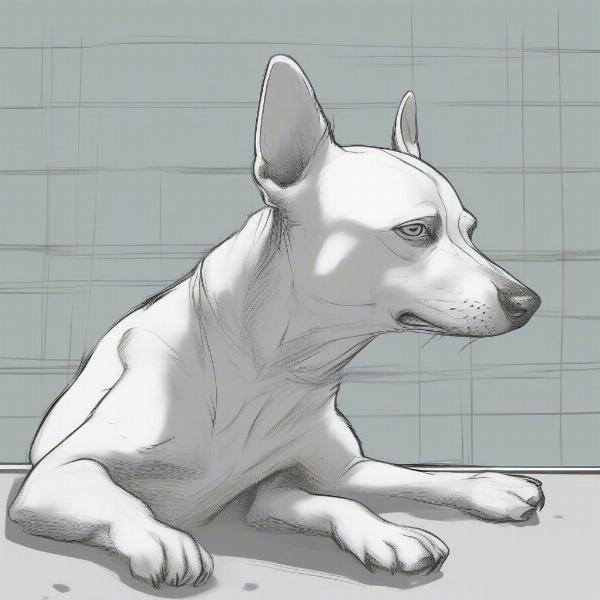Grating dog teeth, also known as bruxism, can be a concerning sign for pet owners. It’s the grinding or gnashing of teeth, often producing an audible sound. While occasional teeth grating might not be a cause for alarm, frequent bruxism can indicate underlying issues that need attention. This article delves into the common causes of teeth grating in dogs, offering practical advice and solutions for concerned pet owners.
Identifying Teeth Grating in Dogs
How do you know if your dog is grating their teeth? The most obvious sign is the grinding sound itself. It might be a subtle scraping or a more pronounced gnashing. You might also notice your dog’s jaw muscles working harder than usual, or they may appear tense or stressed during episodes of teeth grating. Observing your dog’s behavior and noting any accompanying symptoms is crucial in determining the underlying cause.
Common Causes of Teeth Grating in Dogs
Dental Problems
One of the most common culprits behind teeth grating is dental disease. Problems like plaque buildup, gum inflammation, broken teeth, or misaligned bites can cause discomfort, leading dogs to grind their teeth in an attempt to alleviate the pain. reconcile dog Regular dental checkups and professional cleanings are crucial for maintaining your dog’s oral health.
Stress and Anxiety
Just like humans, dogs can experience stress and anxiety. Grating their teeth can be a coping mechanism for dealing with these emotions. Changes in routine, new environments, or loud noises can trigger stress, leading to bruxism. Identifying and addressing the source of stress is key to managing this behavior.
Gastrointestinal Issues
Believe it or not, gastrointestinal problems can also manifest as teeth grating in dogs. Nausea, stomach pain, or parasites can cause discomfort, prompting dogs to grind their teeth. If your dog is experiencing other digestive symptoms like vomiting or diarrhea, a vet visit is recommended.
Neurological Conditions
In rare cases, teeth grating can be a symptom of a more serious neurological condition. Seizures, tremors, or other neurological disorders can cause involuntary jaw movements, including teeth grinding. If you suspect a neurological issue, seek immediate veterinary attention.
 Dog exhibiting stress signs while grating its teeth
Dog exhibiting stress signs while grating its teeth
Why is my dog grating their teeth at night?
Nighttime teeth grating could be related to sleep disorders, pain that intensifies at night, or even dream-related activity. Closely monitoring your dog’s sleep patterns and any accompanying symptoms can help determine the cause.
My puppy is grating their teeth. Is this normal?
Puppies, especially during teething, might grate their teeth as their new teeth emerge. This is often a temporary phase. However, if the behavior persists or is accompanied by other symptoms, consult your veterinarian.
What should I do if my dog is constantly grating their teeth?
Consistent teeth grating warrants a visit to the veterinarian. They can perform a thorough examination, identify the underlying cause, and recommend appropriate treatment. This might include dental cleaning, pain medication, stress management techniques, or further diagnostic testing.
Conclusion
Grating dog teeth can be a sign of various underlying issues, ranging from minor dental problems to more serious health concerns. Recognizing the signs and seeking professional advice when necessary is essential for ensuring your dog’s well-being. By addressing the root cause of the problem, you can help your furry friend live a happier, healthier, and more comfortable life.
FAQ
- What does it sound like when a dog grates its teeth? It can range from a subtle scraping sound to a more audible grinding or gnashing.
- Is teeth grating in dogs always a sign of a problem? Occasional grating might not be a concern, but frequent or persistent grating should be checked by a vet.
- Can stress cause a dog to grate its teeth? Yes, stress and anxiety are common causes of bruxism in dogs.
- How can I help my dog stop grating its teeth? Addressing the underlying cause is crucial. This might involve dental care, stress management, or treating an underlying medical condition.
- What if my dog is grating their teeth and drooling excessively? This could indicate a dental or neurological problem and warrants immediate veterinary attention.
- Should I be concerned if my senior dog starts grating their teeth? Yes, especially if it’s a new behavior. It could indicate age-related dental issues or other health problems.
- Can certain breeds be more prone to teeth grating? While any breed can experience bruxism, some breeds with specific jaw structures might be slightly more predisposed.
Introducing ILM Dog
ILM Dog (https://ilmdog.com) is your trusted resource for comprehensive dog care information. We offer expert advice on breed selection, health and wellness, training, nutrition, grooming, and more. Whether you’re a new dog owner or a seasoned pet parent, ILM Dog provides valuable resources to help you provide the best possible care for your furry companion. Our expertise extends to all aspects of dog ownership, from understanding different breeds to providing guidance on their specific health needs. Contact us today for any inquiries or to learn more about how we can help you and your beloved canine companion. Email: [email protected], Phone: +44 20-3965-8624.